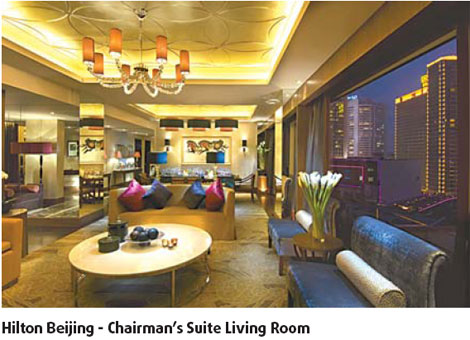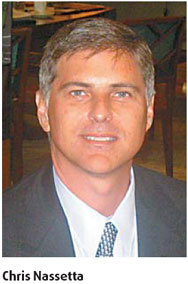


"Expansion" and "Olympics" have been two buzzwords since Chris Nassetta joined US-based Hilton Hotels Corp last December.
"It's my second trip in China in six weeks and Beijing is a marvelous place. We plan to develop 11 brands from the current nine and add 300 hotels in Asia-Pacific over the next 10 years, and China is absolutely the key market," says Nassetta, now president and CEO of Hilton.
Hilton, which debuted in China in 1988, has been running at a moderate pace and opened five hotels before 2007 but now the hotel giant has quickened its pace.
"We plan to add 20 hotels in China by 2010. Hilton has a strategic goal to open 1,000 new hotels in North America in the next 5 years, and another 1,000 hotels outside North America by 2017," says Nassetta.
In his 40s, Nassetta's ambitious plan is based both on his successful experience in hospitality industry and the company's solid base as well as some favorable Chinese government policies.
In 2006, Hilton Hotel Corporation reunited with its overseas arm, Hilton International, a step that primed the enlarged company for a burst of international growth. Last December, with the Chinese government's designation of the United States as having "Approved Destination Status", Hilton saw a huge opportunity for Chinese travelers to experience the full spectrum of its nine Hilton family of brands in the US.
In July, Doubletree Hotel and Hilton Beijing Wangfujing opened for business in Beijing in time to tap demand for hotels from Olympic Games enthusiasts. This also marked the launch of the Doubletree by Hilton brand in Asia.
Hilton is making efforts to help overseas visitors get integrated into Chinese culture with a pocket guide offering helpful tips for on Chinese customs, culture and etiquette. The hotel also provides useful resources including maps, directions, taxi information and translation services for visitors.
In a recent exclusive interview, Chris Nassetta spoke to China Business Weekly reporter Bi Xiaoning about the firm's strategy in China.
Q: With the newly opened Hilton Beijing Wangfujing and Doubletree, Hilton operates three hotels in Beijing now. How is the business going?
A: We saw our occupancy shoot up in the period of Olympic Games. During this period, our hotels in Beijing were running at high capacity, with the occupancy for the opening and closing dates of the Olympics over 90 percent. For the duration of the Olympic period on average the occupancy for our Beijing hotels were in the high 80 percent.
Q: As a time-honored luxury hotel brand, what's the point of building multiple brands?

A: Hilton's belief is that consumers should be able to choose between a multitudes of brands, each offering a different product for a different market segment. Hilton is the core brand, offering full-service hotels and resorts for the upscale segment.
We offer brands targeting the top end of the luxury segment, such as the Waldorf-Astoria Collection and Conrad Hotels & Resorts. We are also developing a new "lifestyle hotel" brand that we expect to appeal to travellers across Asia.
Hilton is also developing upscale mid-market and economy properties in the international markets with a focus on launching three brands, Doubletree by Hilton, Hilton Garden Inn and Hampton by Hilton.
Q: In what kind of business model can Hilton maintain such a fast growth momentum?
A: Hilton largely follows a management and franchise business model. We will focus on brand management and daily operations and leave the investment and ownership of the hotels to others.
For instance, in 2007, a joint venture company was launched by RREEF (the global alternative investment management arm of Deutsche Bank) and private equity firm H&Q Asia Pacific to develop and manage a portfolio of more than 25 focused service hotels in mainland under the Hilton Garden Inn brand.
Q: For the company's global business, what's the role of the market in the Asia-Pacific region, especially in China?
A: Currently, the business in Asia Pacific region contributes approximately 5 percent of the company's revenue. We expect this proportion to grow significantly over time. We see great growth opportunities in the China market, driven by strong economic growth, a growing middle class and a strong demand for domestic travel as well as in-bound international travel.
Q: What is the challenge for Hilton in developing business in China?
A: It is a challenge to meet the enormous demand for skilled and trained team members that can deliver the right level of service.
Hilton Hotels is exploring partnerships with educational hospitality management institutions in China to enhance training and education of local talent and potential team members.
Q: Does Hilton have some unique skills to attract loyal customers?
A: We aim to grow the award-winning Hilton HHonors loyalty program significantly through partnerships and the launch of a new Chinese language website that enables online room bookings around the world.
Hilton HHonors is the only hotel loyalty program that offers hotel rewards and airline miles simultaneously, with no blackout periods. Hilton believes this will get well with high potential travelers in China who will be able to redeem stays in Hilton Family hotels worldwide.
(China Daily 09/01/2008 page7)













